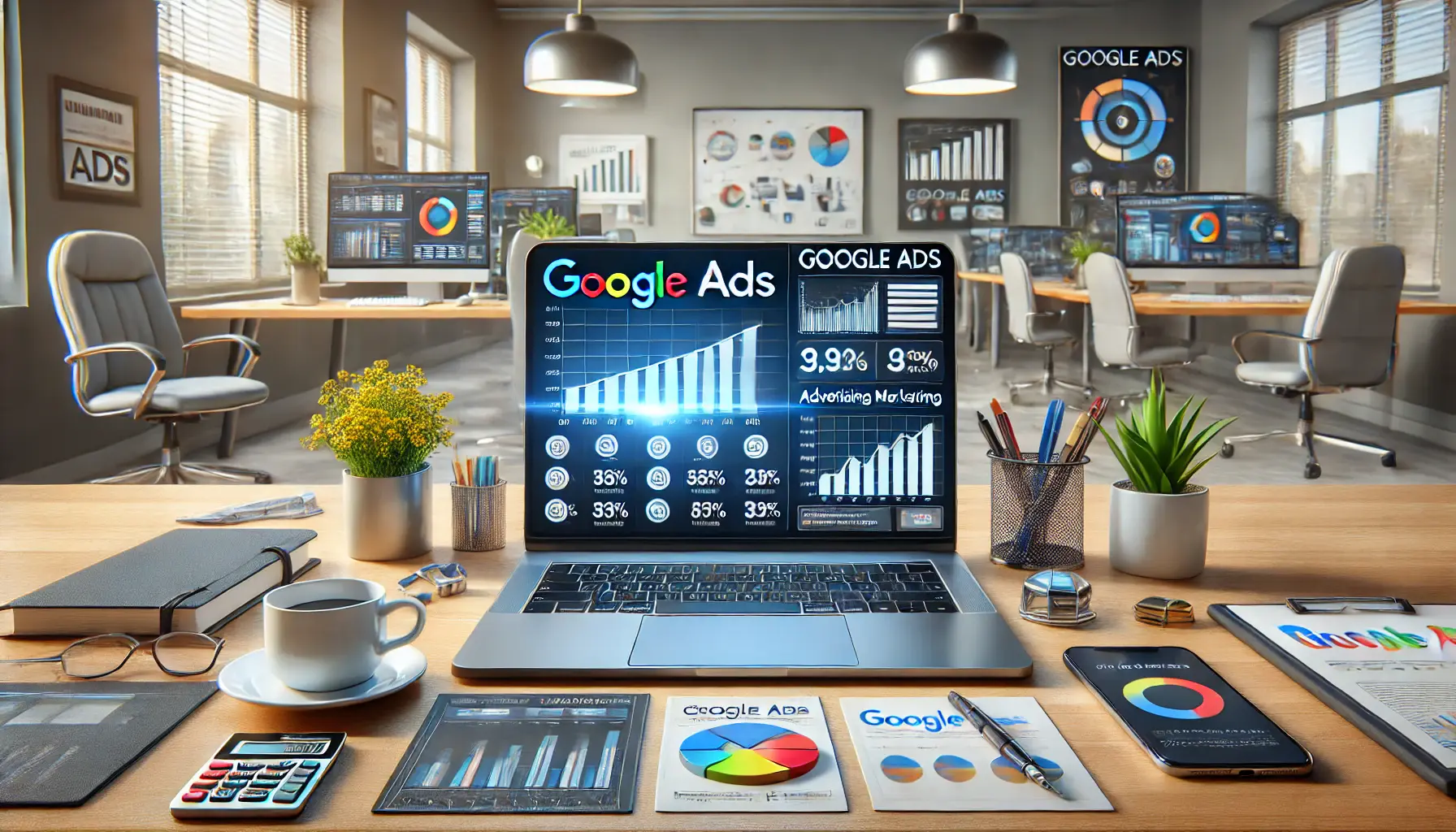Google Ads have grown to be one of the most powerful mechanisms in the realm of digital marketing, enabling businesses of all sizes to reach their target audience effectively.
But with so many options at your fingertips, a common question still seems to be, do Google Ads work?
It’s a common question when it comes to a business looking at its marketing strategies and budgets.
In this article, we’ll take a closer look at how Google Ads work, along with some key benefits and actual applications.
- Understanding Google Ads: An Overview
- Measuring the Effectiveness of Google Ads
- Factors Influencing Google Ads Success
- Case Studies: Success Stories of Google Ads
- Common Challenges in Google Ads and How to Overcome Them
- Do Google Ads Work? Final Thoughts on Effectiveness
- Google Ads Effectiveness: Frequently Asked Questions
Understanding Google Ads: An Overview
Google Ads is a pay-per-clickAn advertising model where advertisers pay only when a user clicks on their ad. advertising platform where businesses can create targeted campaigns to capture user interest.
From small business owners to large corporations, Google Ads has something to offer in terms of driving traffic and increasing conversions.
So, how does it all work?
The platform operates on an auction-based systemA system where ad placement is determined by bidding among advertisers., where advertisers bid on keywords related to their products or services.
When users search for these terms on Google, ads appear alongside the organic results, helping businesses connect with potential customers at the right moment.
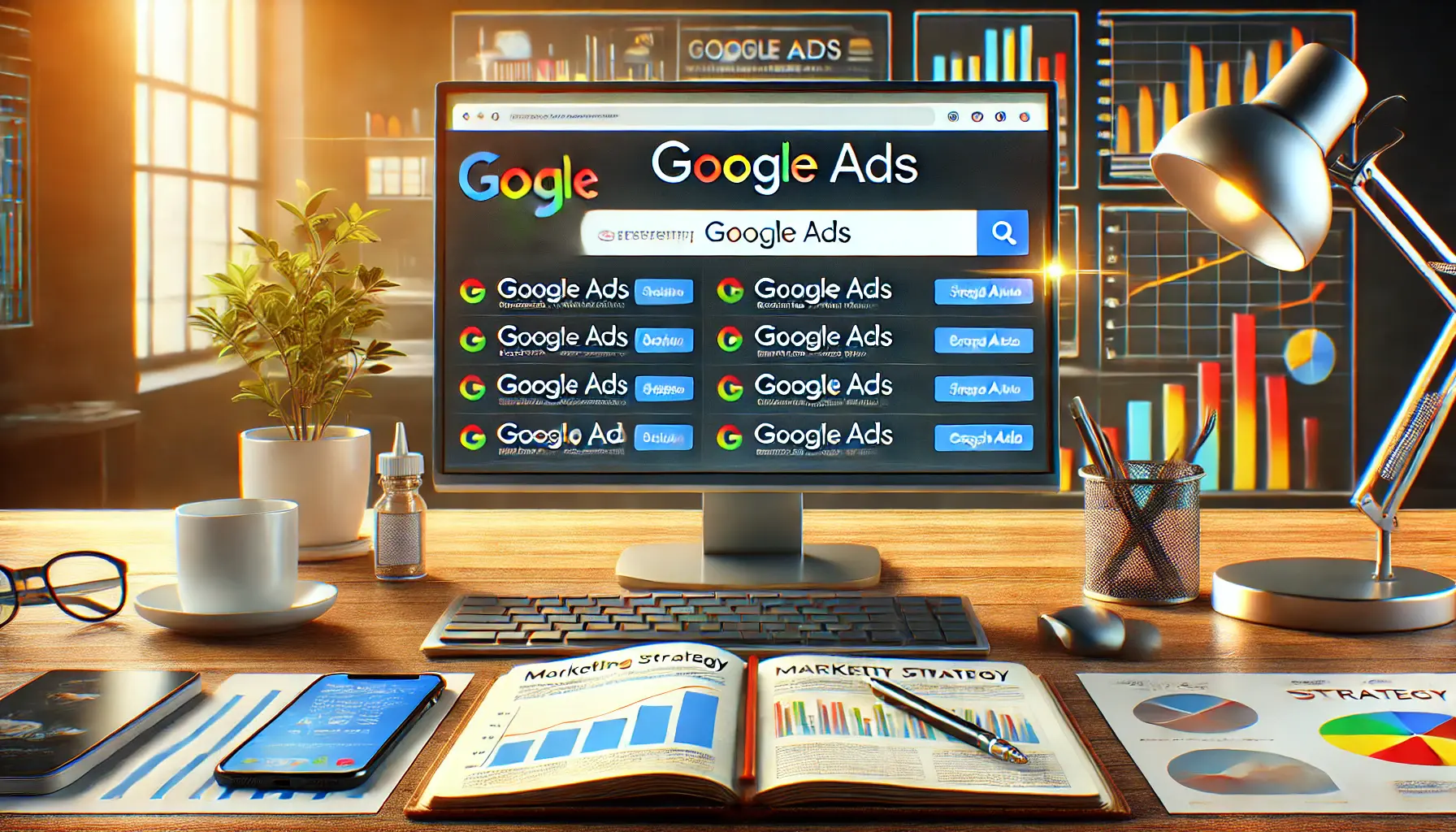
Illustration of Google Ads displayed on a search engine results page in a professional office setting.
What Are Google Ads?
Google Ads, previously known as Google AdWords, is a platform where advertisers pay to display their content, including ads, services, or videos, to a specific audience.
It’s an essential tool for businesses seeking to enhance visibility on Google’s search engine results page (SERPSearch Engine Results Page, the list of results displayed by a search engine after a query.).
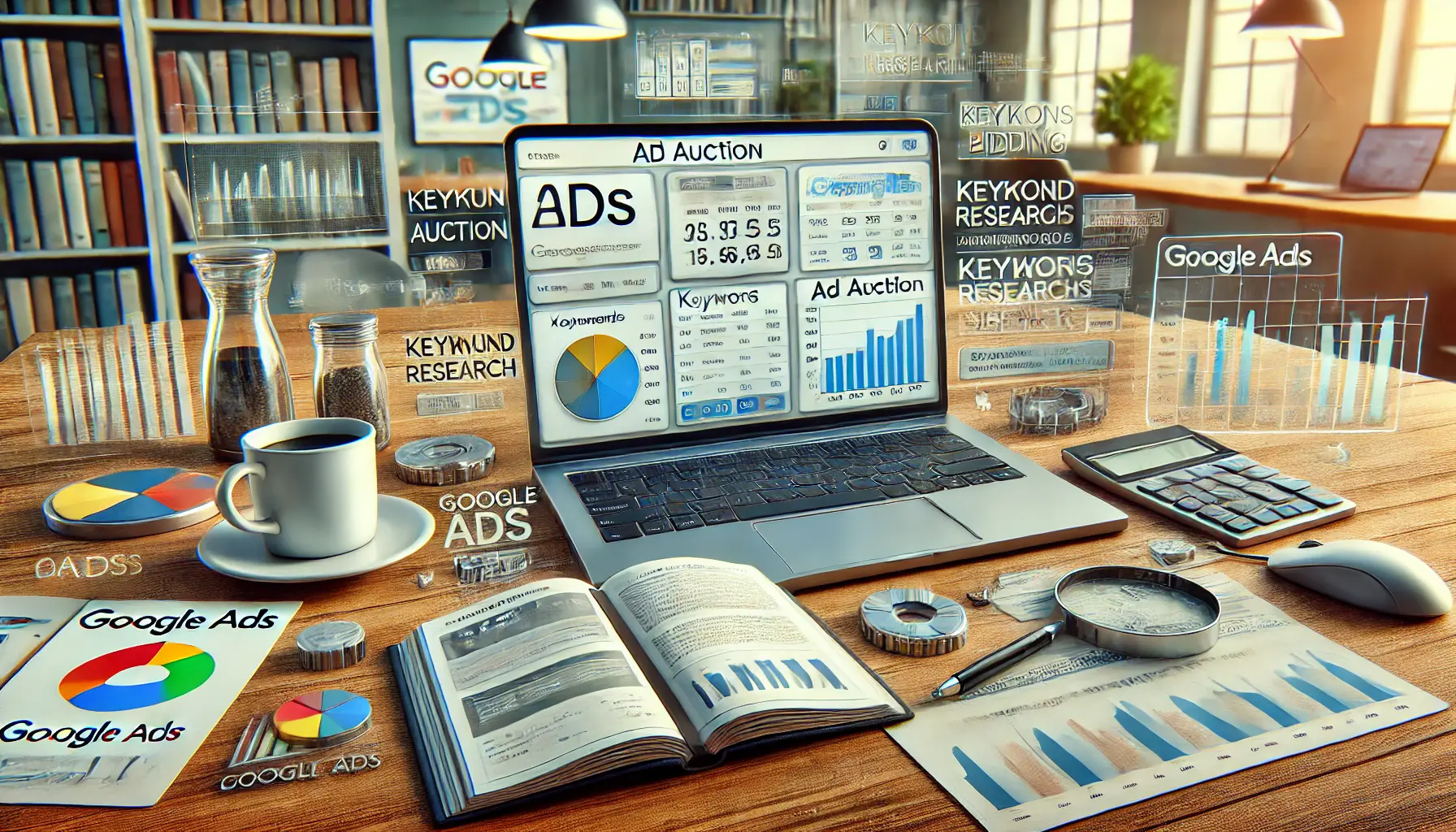
Illustration of the functionality of Google Ads with a focus on keyword bidding and ad auctions in a professional workspace.
How Do Google Ads Function?
The process begins with keyword selection.
Advertisers choose relevant keywords and create ads that align with user intent.
Google then displays these ads based on factors like bid amount, quality scoreGoogle's rating of the relevance and quality of keywords, ads, and landing pages., and search relevance.
When a user clicks on the ad, the advertiser pays a fee, hence the term pay-per-click.
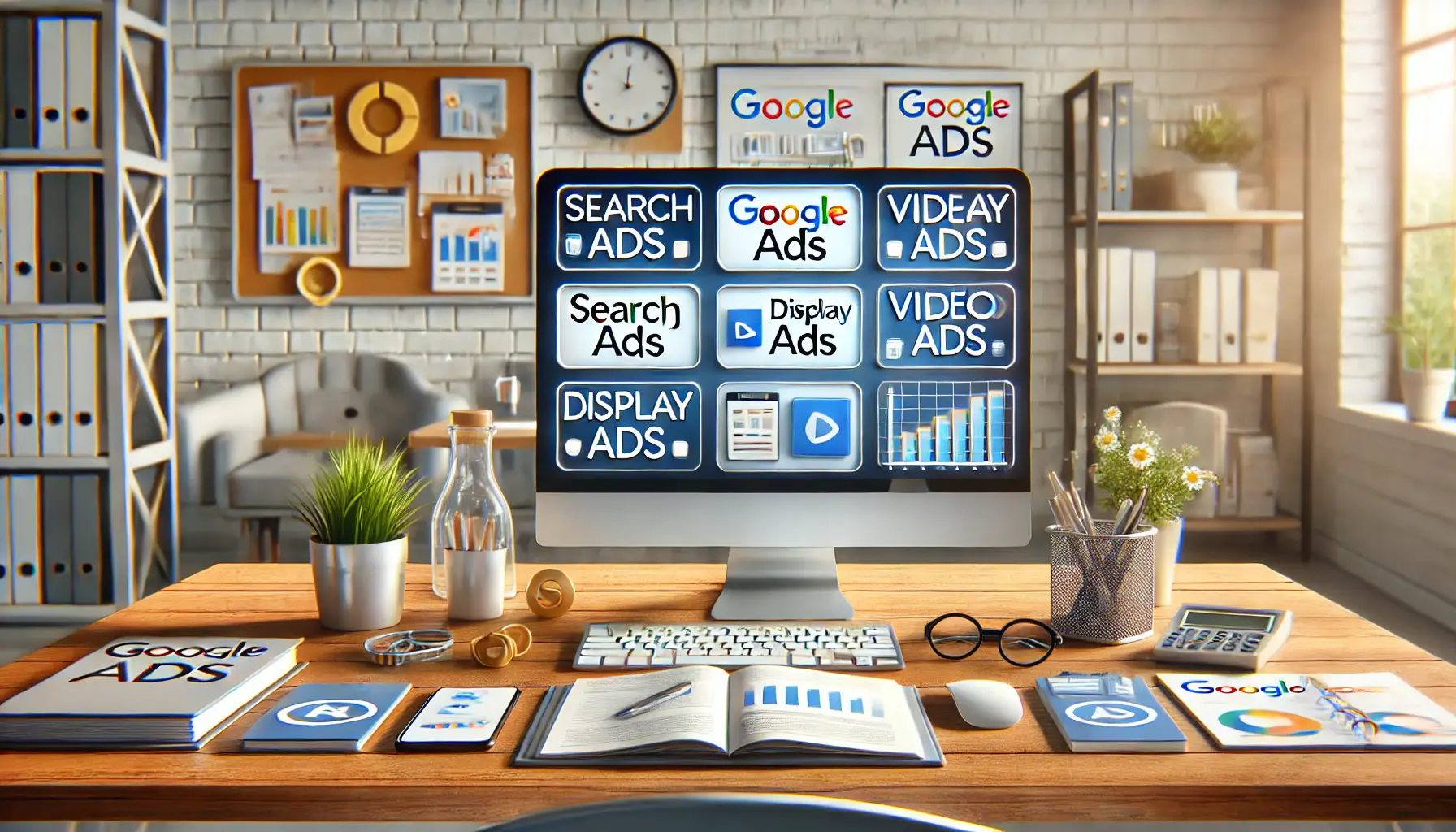
Representation of different Google Ads campaign types in a professional and organized workspace.
Types of Google Ads Campaigns
Google Ads offers a number of campaign types to fit your needs for different business goals.
Some of the most popular options include the following:
- Search Campaigns: Ads come up as text-based listings on search engine results pages.
- Display Campaigns: Visual ads displayed across Google’s network of partner sites.
- Shopping Campaigns: Showcase products directly in search results with images and pricing.
- Video Campaigns: Video-based ads, mostly running on YouTube.
- App Campaigns: Focused on driving app downloads and engagement.
Each campaign type serves different purposes, making it essential to align your choice with your business objectives.
Google Ads operates on a pay-per-click system, ensuring businesses only pay for measurable results. It’s an essential tool for driving conversions effectively.

Illustration of tools and analytics used for measuring Google Ads effectiveness in a professional workspace.
Measuring the Effectiveness of Google Ads
To determine if Google Ads work for your business, it’s essential to monitor specific Key Performance Indicators (KPIs).
These metrics provide insights into your campaigns’ performance and help identify areas for improvement.
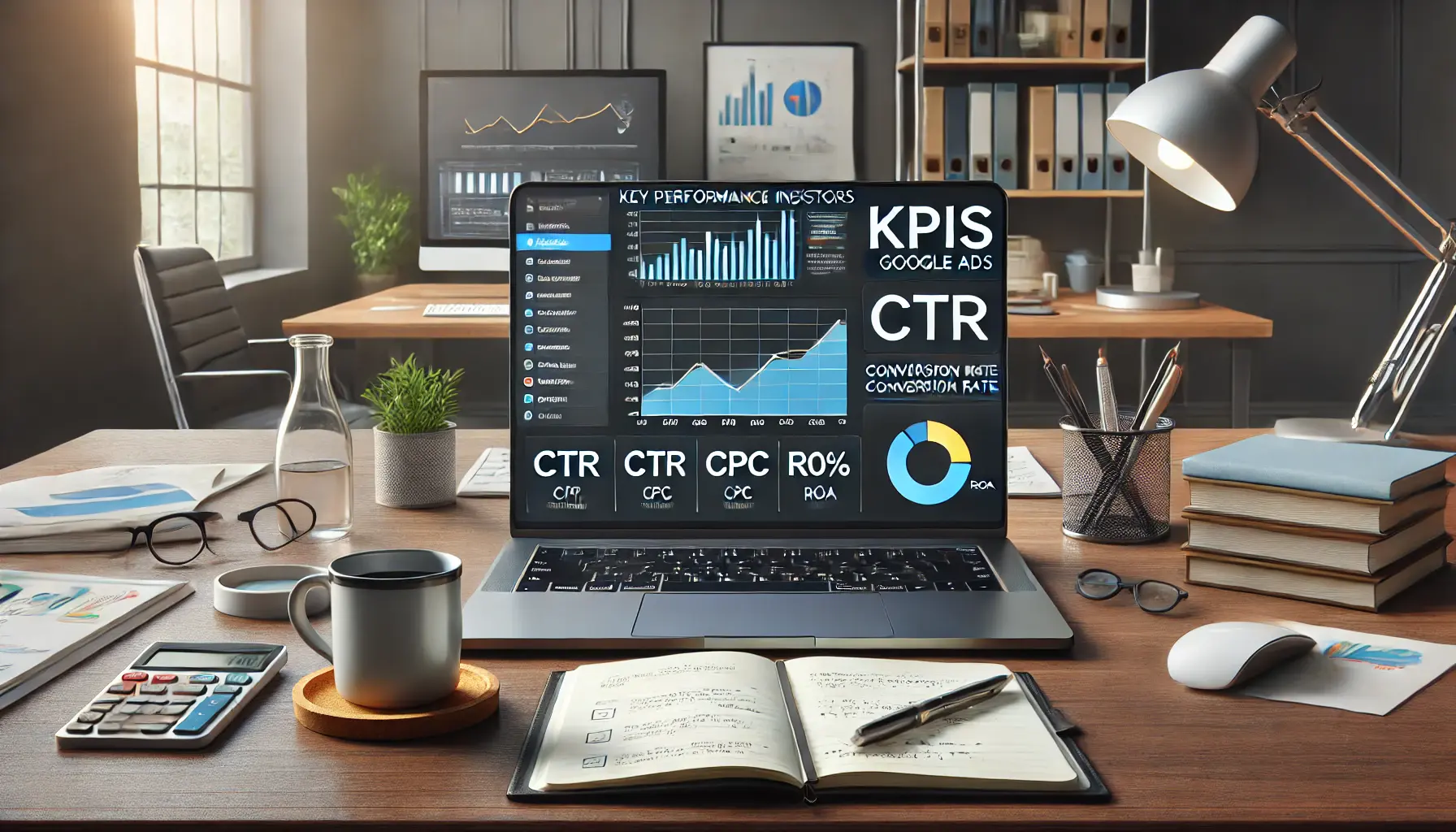
Visualization of KPIs for Google Ads in a professional and analytical workspace.
Key Performance Indicators (KPIs) for Google Ads
Here are some crucial KPIs to consider:
- Click-Through Rate (CTR): This measures the percentage of users who click your ad after they have viewed it. A high CTR indicates that your ad resonates well with your audience.
- Conversion Rate (CVR): This KPI measures the number of users who undertake an intended action upon clicking on your ad, such as buying something or filling out a form.
- Cost Per Click (CPC): This metric lets you know your average cost for any click on your ad. Monitoring CPC will help in working out your budget effectively and efficiently.
- Cost Per Acquisition (CPA): This is the amount it takes on average to win one customer. Maintaining a low CPA ensures you get value from your ad spend.
- Return on Ad Spend (ROAS): This measures the revenue generated for every dollar spent on ads. A higher ROAS indicates a more profitable campaign.
- Quality Score: Google’s rating of the relevance and quality of your keywords and ads. A higher Quality Score can lead to lower costs and better ad positions.
Illustration of tracking and analysis tools for Google Ads in a professional workspace.
Tracking and Analysis Tools
Using the right tools can improve your ability to track these KPIs:
- Google Ads Dashboard: Provides real-time data on your campaigns, including impressions, clicks, and conversions.
- Google Analytics: Offers in-depth insights into user behavior on your website post-click, helping you understand the customer journey.
- Google Ads Editor: A free tool for performance tracking, bulk editing, and ad creation, allowing for efficient campaign management.
- Third-Party Tools: Platforms like WordStream and Reporting Ninja provide advanced analytics and reporting features to optimize your campaigns.
By constantly monitoring these KPIs and using the right tools, you can measure and improve the performance of your Google Ads campaigns, ensuring they work effectively for your business.
Tracking key performance indicators like CTRClick-Through Rate, the percentage of users who click on an ad after seeing it., ROASReturn on Ad Spend, a metric measuring revenue earned for each dollar spent on ads., and Quality Score is vital to evaluate and improve the success of your Google Ads campaigns.
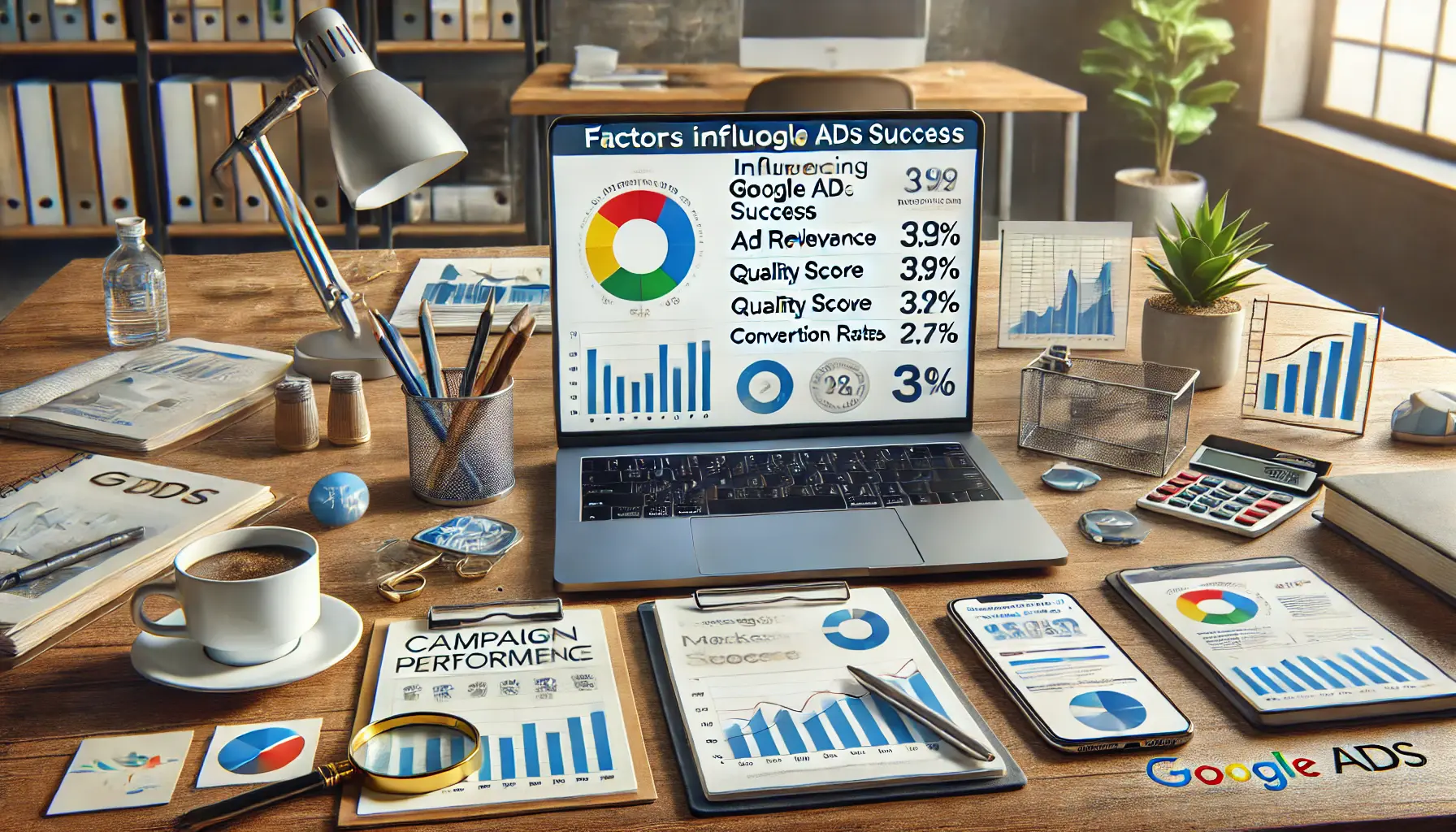
Illustration of key factors influencing the success of Google Ads campaigns in a professional setting.
Factors Influencing Google Ads Success
Understanding the elements that impact the effectiveness of your Google Ads campaigns is crucial for achieving optimal results.
Several key factors play a significant role in determining the success of your advertising efforts.
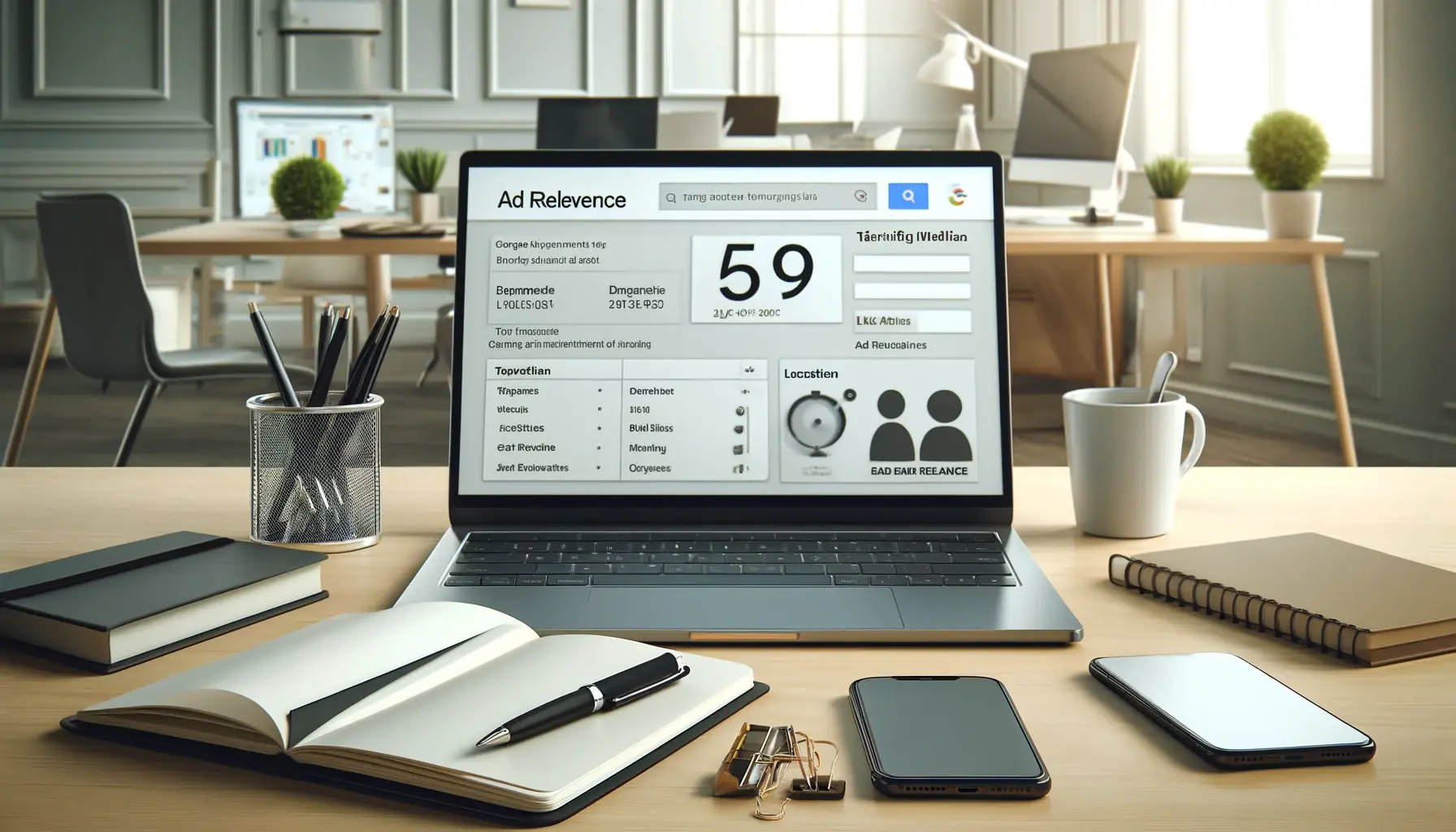
Illustration of ad relevance and targeting in a professional digital marketing workspace.
Ad Relevance and Targeting
Ensuring that your ads are highly relevant to the keywords and search queries you’re targeting is essential.
When your ad copy closely matches user intent, it increases the likelihood of engagement and improves your Quality Score.
Utilizing precise targeting options, such as location, demographics, and device preferences, allows you to reach the most appropriate audience for your products or services.

Illustration of an effective landing page experience in a professional digital marketing setup.
Landing Page Experience
The quality of your landing page significantly affects your ad performance.
A well-designed landing page that aligns with your ad content provides a seamless user experience, leading to higher conversion rates.
Factors such as page load speed, mobile-friendliness, and clear calls-to-action contribute to a positive landing page experience.

Illustration of budget allocation and bidding strategies for Google Ads in a professional workspace.
Budget Allocation and Bidding Strategies
Effective budget management and bidding strategies are crucial to maximize your return on investment.
Allocating sufficient budget to high-performing campaigns and using bidding strategies that align with your business goals can help increase the visibility and competitiveness of ads.
Regularly reviewing and adjusting your bids based on performance data ensures efficient utilization of your advertising spend.
By focusing on ad relevance and targeting, landing page experience, and proper budget allocation and bidding strategies, you can significantly improve the success of your Google Ads campaigns.
Key factors such as ad relevance, landing page experience, and effective budget allocation significantly impact the success of Google Ads campaigns. Optimize these areas for better outcomes.

Illustration of Google Ads success stories and case studies in a professional workspace.
Case Studies: Success Stories of Google Ads
Exploring real-world examples can provide valuable insights into how Google Ads work effectively across various industries.
Here are some notable success stories:

Illustration of Beekman 1802’s transformation from a farm to a skincare brand in a professional workspace.
Beekman 1802: From Farm to Skincare Giant
Beekman 1802, originally a small goat farm, leveraged Google Ads to expand its e-commerce presence.
By bidding on branded terms and directing users to their online store, they successfully transitioned into a renowned skincare brand.
This strategy enabled them to reach a broader audience and significantly boost online sales.
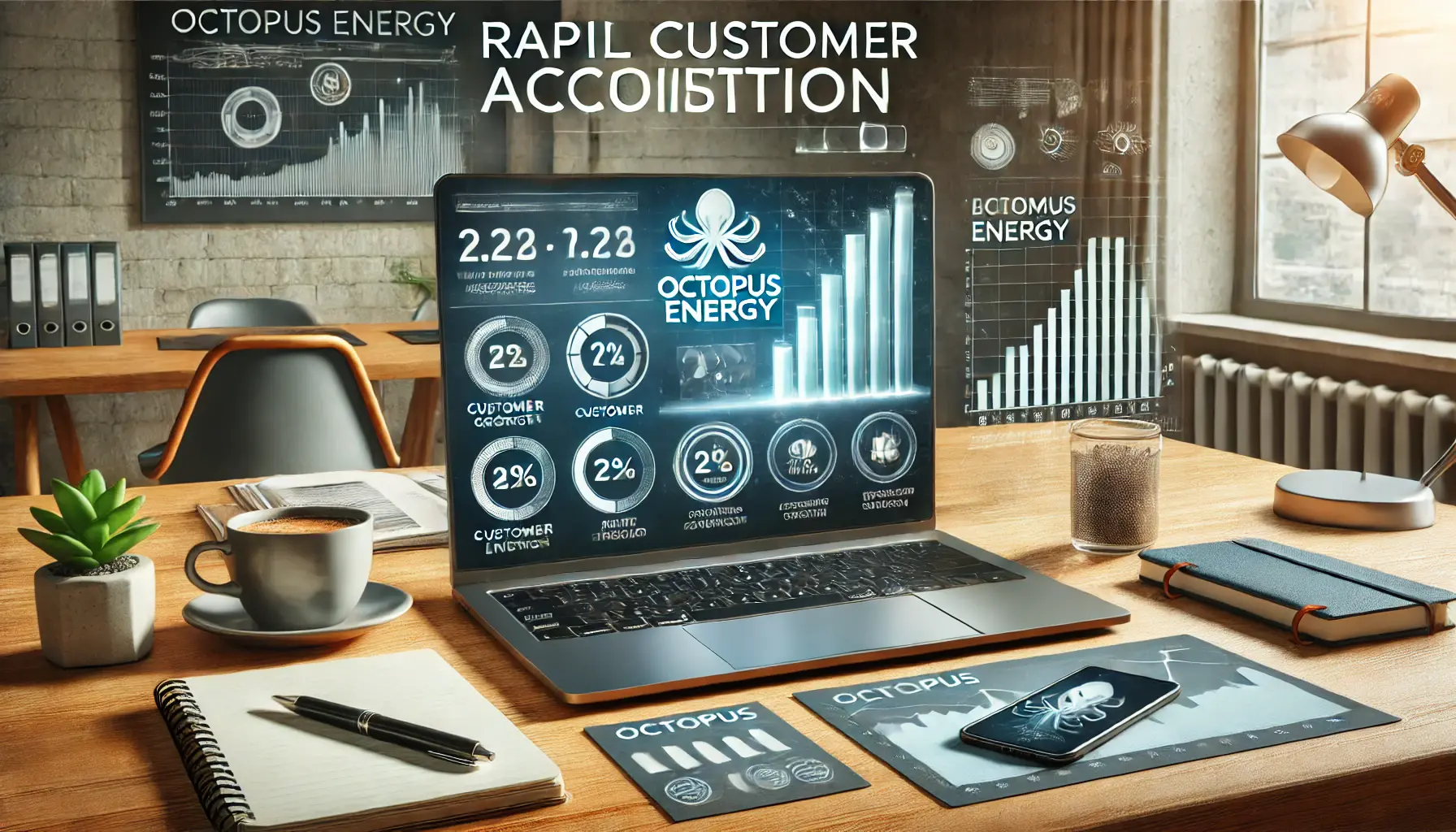
Illustration of Octopus Energy’s rapid customer acquisition through digital marketing and analytics in a professional workspace.
Octopus Energy: Rapid Customer Acquisition
Octopus Energy utilized Google Ads to sign up over 2 million customers.
By employing reactive keyword strategies and adapting to market changes, they reduced their cost per acquisition by 36% and increased top-of-page impressions by 22%.
This approach allowed them to effectively compete in the energy sector and grow their customer base substantially.

Illustration of Accor Hotels improving conversions using ad extensions in a digital marketing workspace.
Accor Hotels: Enhancing Conversions with Ad Extensions
Accor Hotels added Google Ad ExtensionsAdditional information like phone numbers or links that can be added to Google Ads. to include more information and links in their ads.
This approach realized a 14% increase in incremental conversions, proving that enhancing ad visibility and user choices leads to better engagement and results.
These case studies demonstrate the different ways businesses have harnessed the power of Google Ads to achieve tremendous growth and success.
By tailoring strategies to specific goals and continuously optimizing campaigns, companies can effectively utilize Google Ads to reach their target audiences and drive meaningful results.
Real-world examples, like Beekman 1802 and Octopus Energy, showcase how Google Ads can drive significant growth with well-targeted and optimized campaigns.

Illustration of challenges in Google Ads and strategies for overcoming them in a professional workspace.
Common Challenges in Google Ads and How to Overcome Them
While Google Ads can be a powerful tool for driving traffic and increasing conversions, advertisers often encounter several common challenges.
Understanding these issues and implementing effective solutions can significantly enhance your campaign performance.
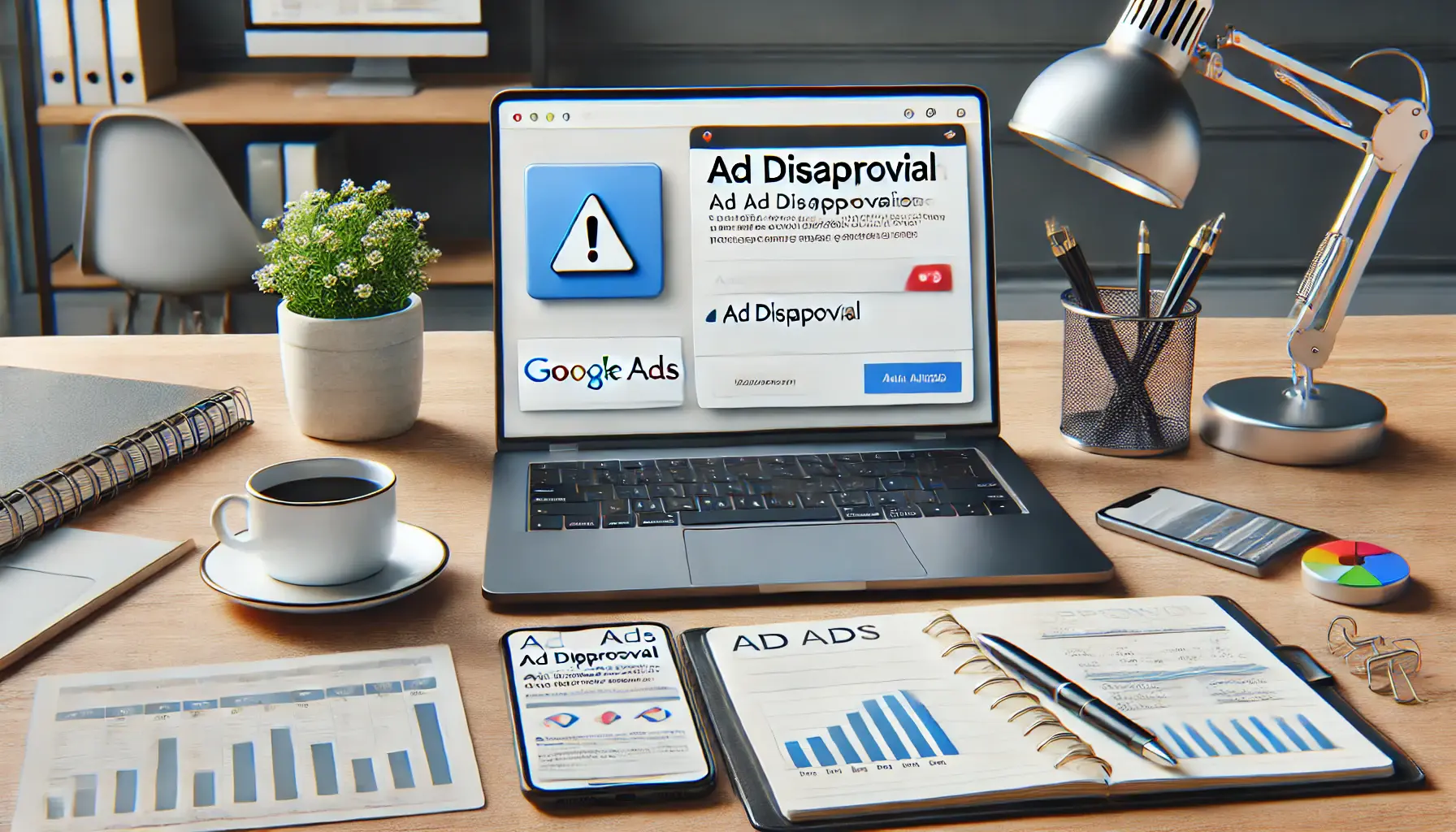
Illustration of ad disapprovals in Google Ads and troubleshooting in a professional workspace.
1. Ad Disapprovals
Google maintains strict advertising policies, and non-compliance can lead to ad disapprovals.
Common reasons include:
- Misleading content
- Inappropriate language
- Non-compliance with industry-specific regulations
Solution: Familiarize yourself with Google’s advertising policies to ensure your ads comply.
Create clear and honest ads that accurately represent your product or service.
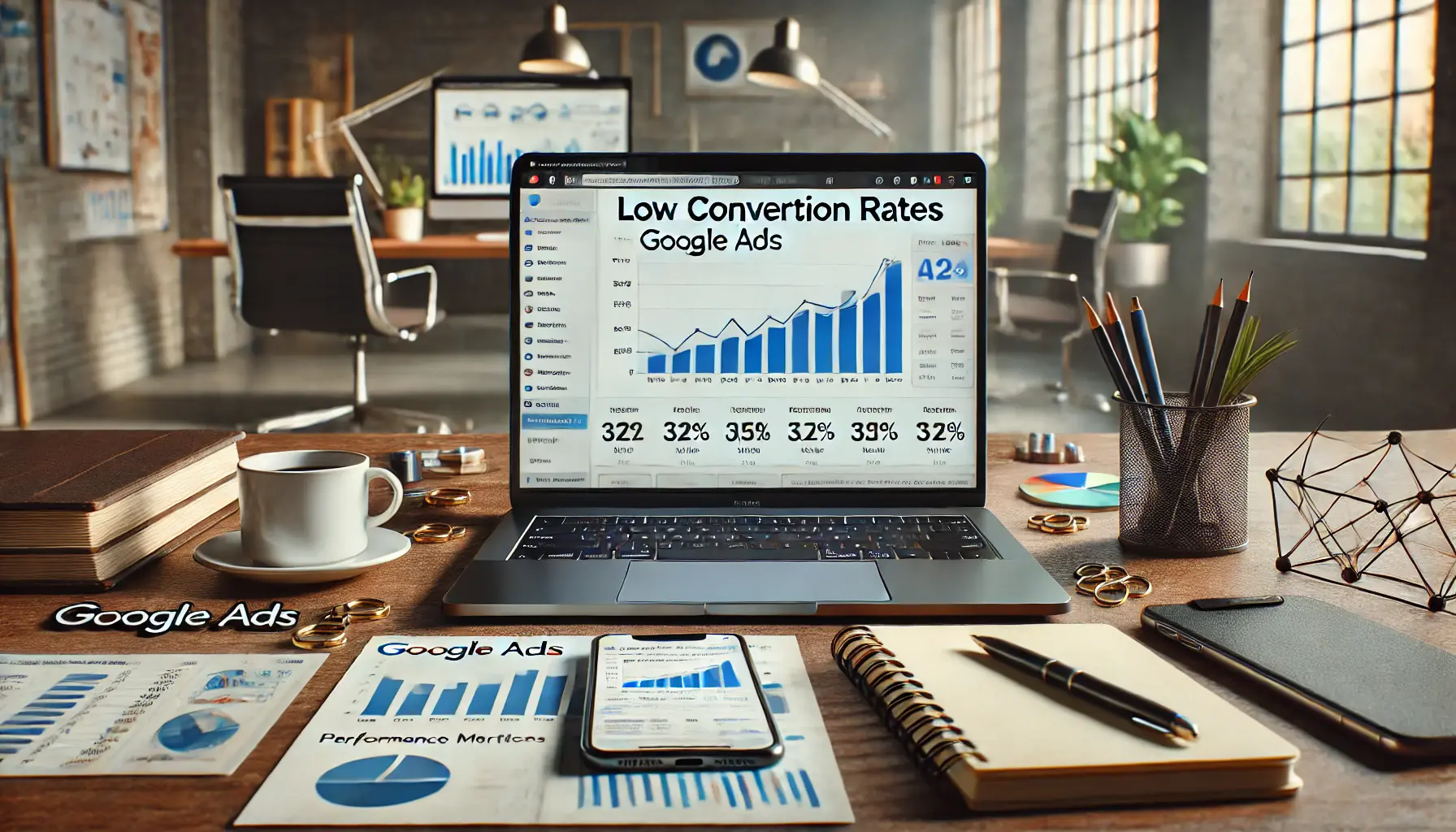
Illustration of low conversion rates in Google Ads and strategies for improvement in a professional workspace.
2. Low Conversion Rates
Achieving clicks without conversions can be frustrating and costly.
Factors contributing to low conversion rates include:
- Poor landing page design
- Irrelevant ad copy
- Inadequate call-to-action
Solution: Ensure the landing page aligns with the advertisement to provide continuity in user experience.
Utilize attention-grabbing yet relevant ad copy with clear calls to action that guide users toward the desired action.
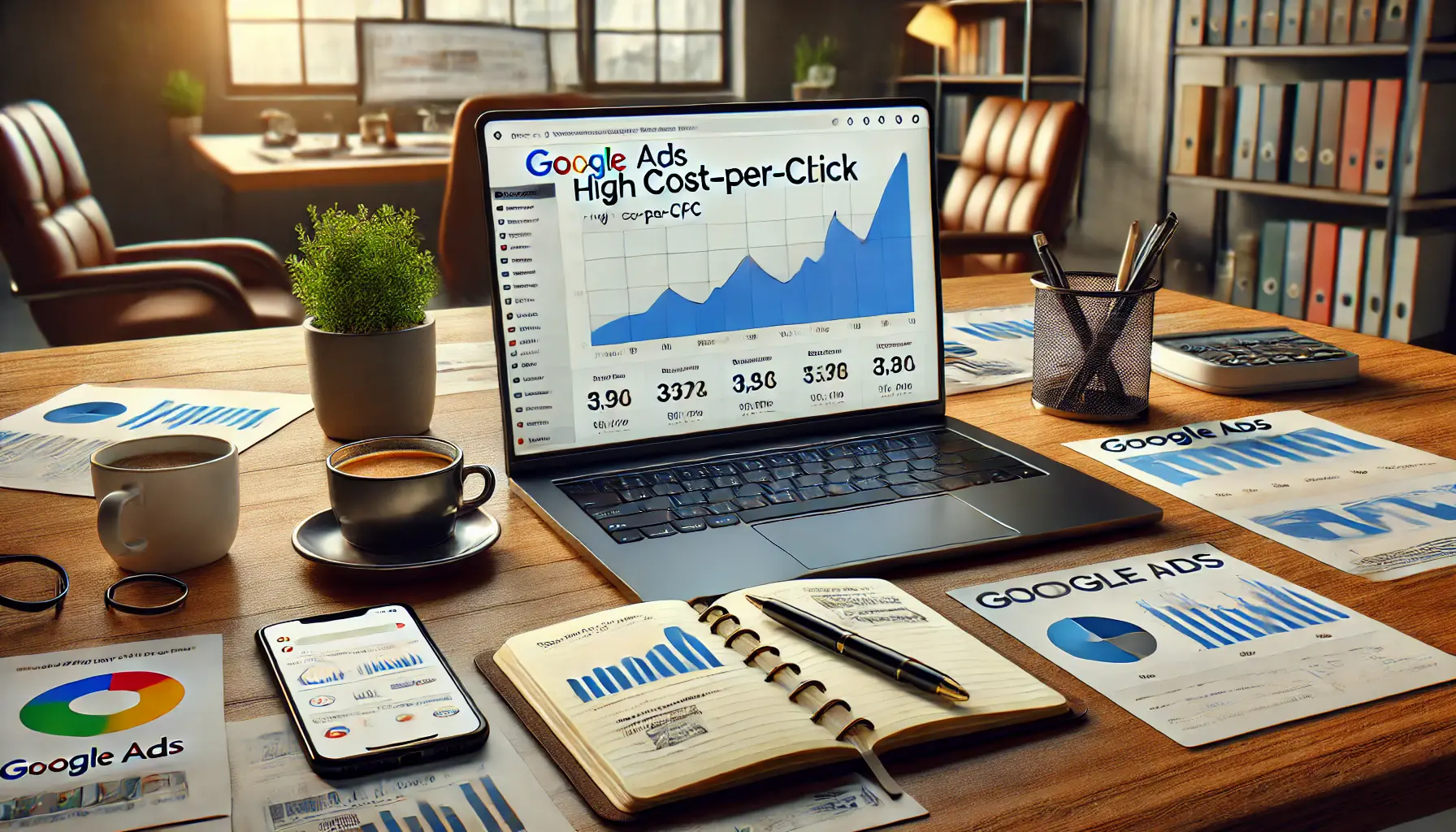
Illustration of high cost-per-click (CPC) in Google Ads and strategies for optimization in a professional workspace.
3. High Cost-Per-Click (CPC)
High CPCCost Per Click, the amount paid by an advertiser for each click on their ad. can quickly drain your budget, limiting the reach of your campaigns.
Solution: Conduct thorough keyword research to identify cost-effective keywords.
Utilize negative keywordsKeywords that prevent ads from appearing for irrelevant search terms. to filter out irrelevant traffic and adjust your bidding strategy to focus on high-performing keywords.
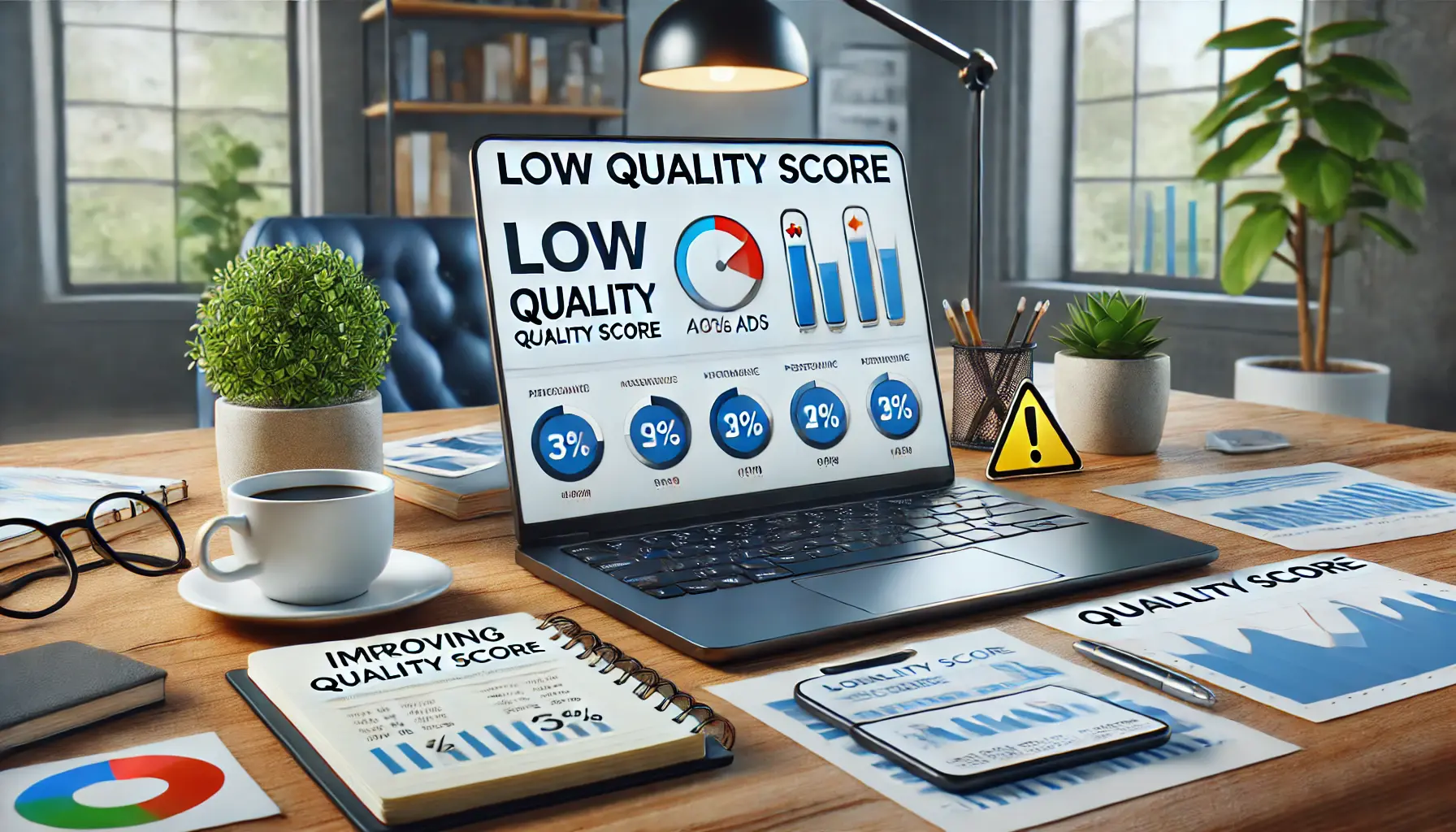
Illustration of low quality score in Google Ads and strategies for improvement in a professional workspace.
4. Low Quality Score
Quality Score affects your ad rankings and CPC.
A low score can hinder your campaign’s effectiveness.
Solution: Improve your Quality Score by making ads more relevant, enhancing landing pages, and increasing expected click-through rates.
Regularly review and refine your keywords and ad copy to maintain high relevance.
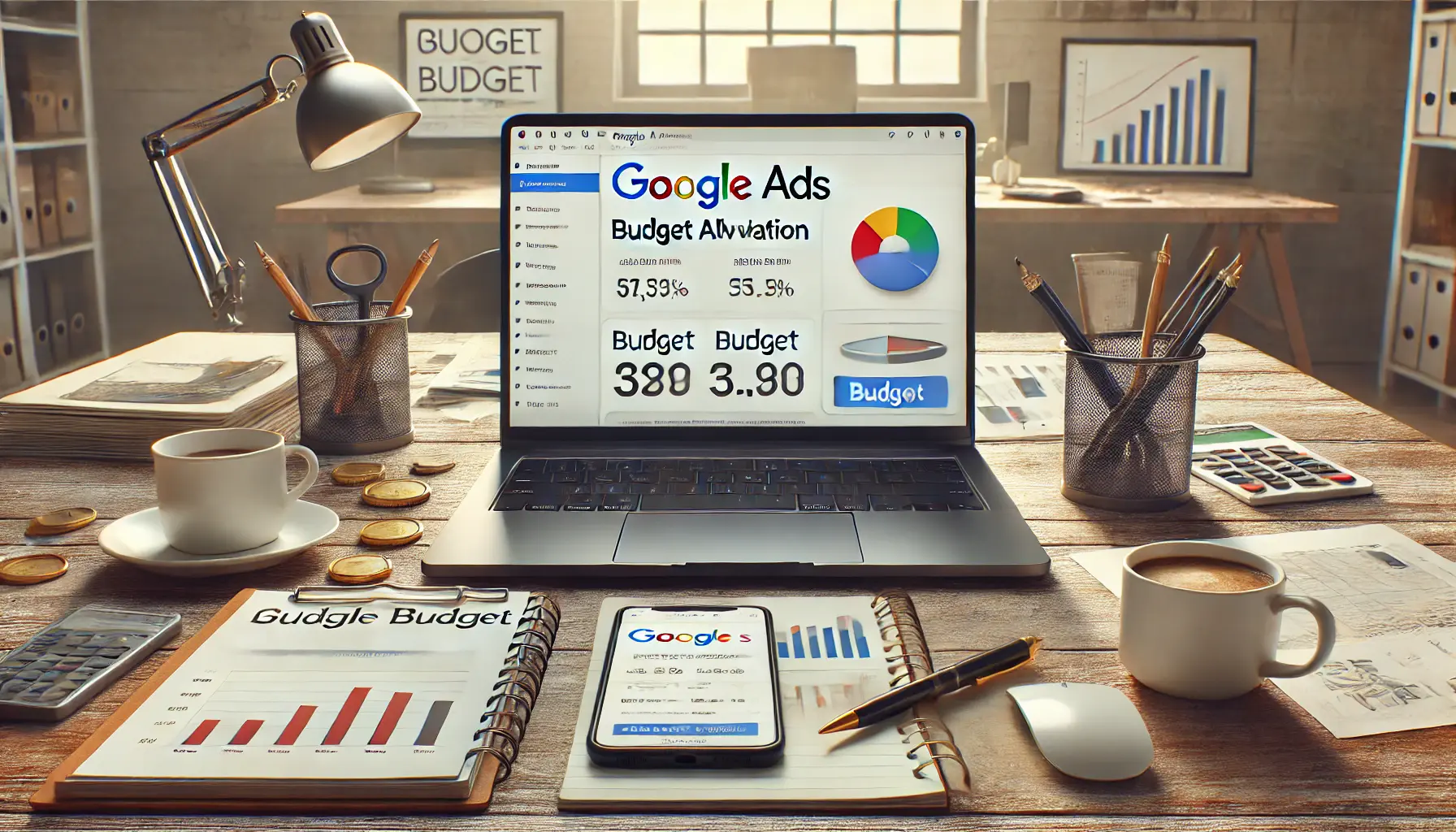
Illustration of managing a limited advertising budget in Google Ads within a professional workspace.
5. Limited Advertising Budget
Small businesses often struggle with budget constraints, making it challenging to compete effectively.
Solution: Focus your budget on campaigns that deliver the highest return on investment.
Use geotargetingTargeting users based on their geographic location. and ad scheduling to prioritize your best prospects.
Continuously review and optimize your ad spend to ensure maximum efficiency.
By addressing these challenges early, you can ensure that Google Ads delivers solid results, complementing your business and driving meaningful growth.
Address challenges like ad disapprovals, high CPC, and low Quality Scores by adhering to Google policies, refining keyword selection, and improving ad relevance.
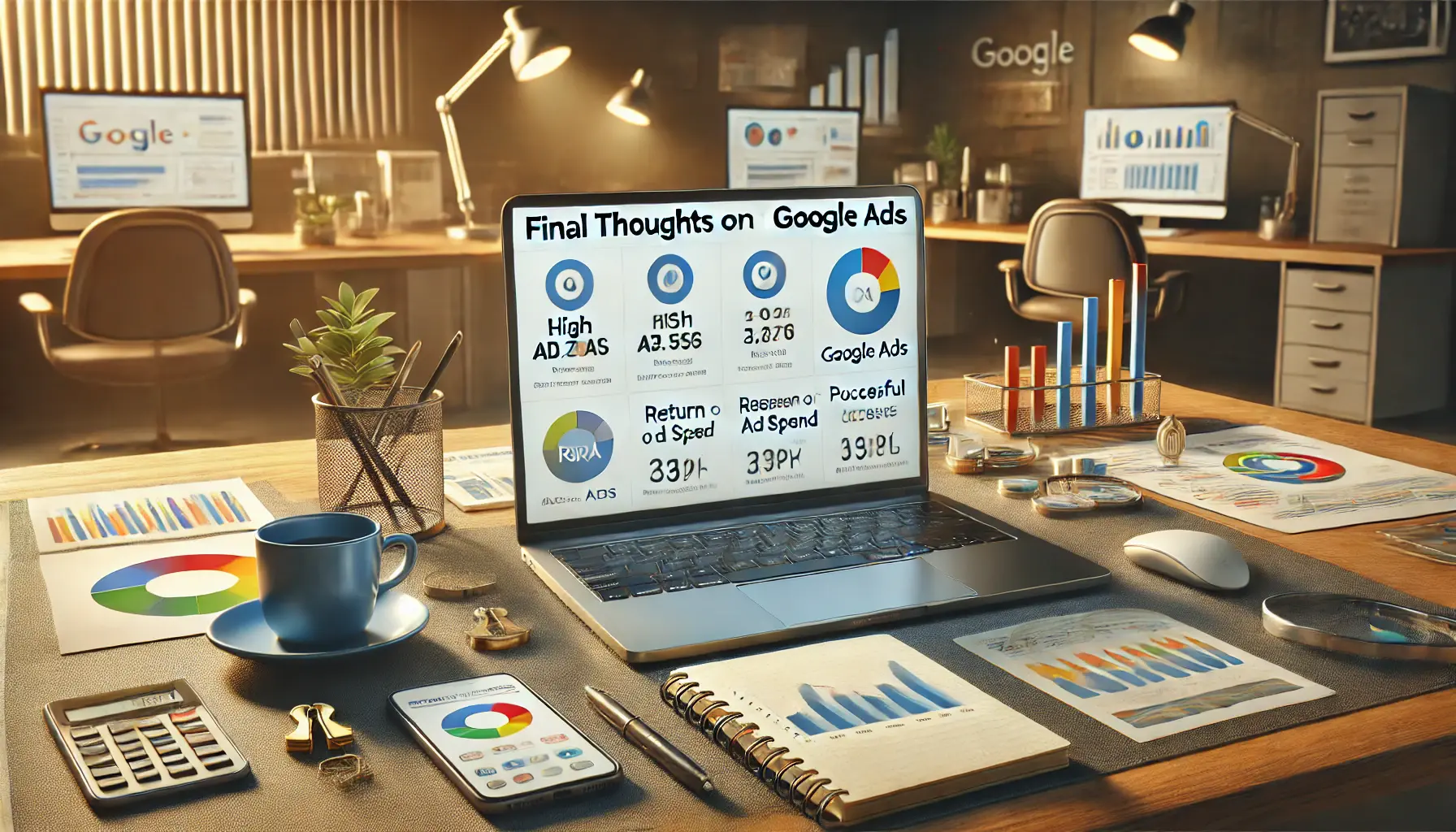
Illustration of evaluating the effectiveness of Google Ads in a professional digital marketing workspace.
Do Google Ads Work? Final Thoughts on Effectiveness
Google Ads has become a necessary tool for businesses that want to improve visibility, increase traffic, and ensure valuable conversions.
In this article, we have learned how Google Ads works, its most important metrics, what factors can determine success, case studies from real life, and common problems faced by advertisers.
Understanding these aspects will enable you to harness the full power of Google Ads to grow your business.
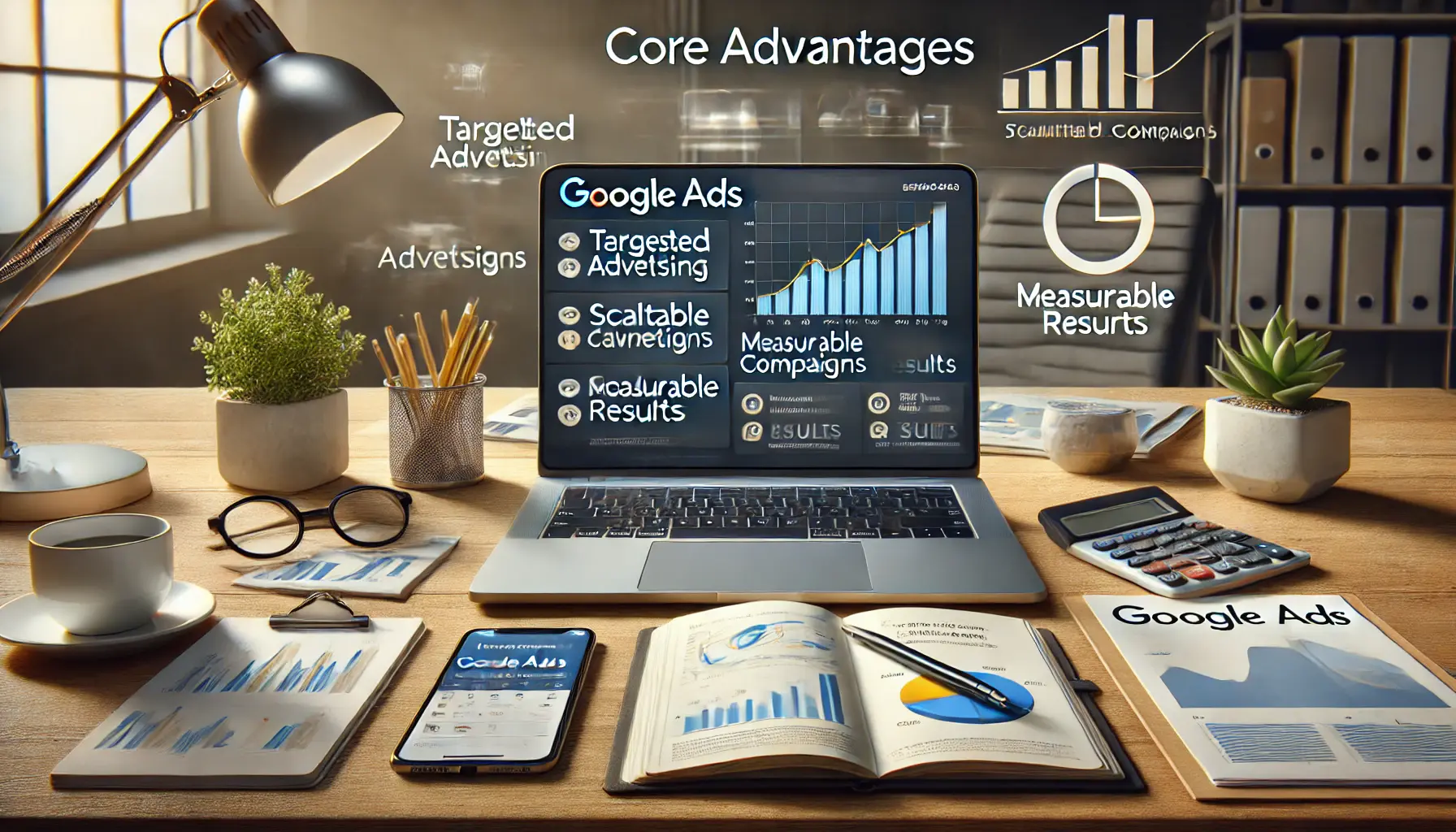
Illustration of the core advantages of Google Ads in a professional digital marketing workspace.
The Core Advantages of Google Ads
Google Ads offers unparalleled advantages when used strategically:
- Targeted Advertising: Reach specific audiences through precise targeting based on keywords, location, demographics, and user intent.
- Scalable Campaigns: Start with a small budget and scale as you see results, making it accessible to businesses of all sizes.
- Measurable Results: Track and optimize campaign performance using KPIs such as CTR, CPC, and ROAS.
- Enhanced Reach: Tap into Google’s extensive network to connect with users across search, display, video, and shopping platforms.
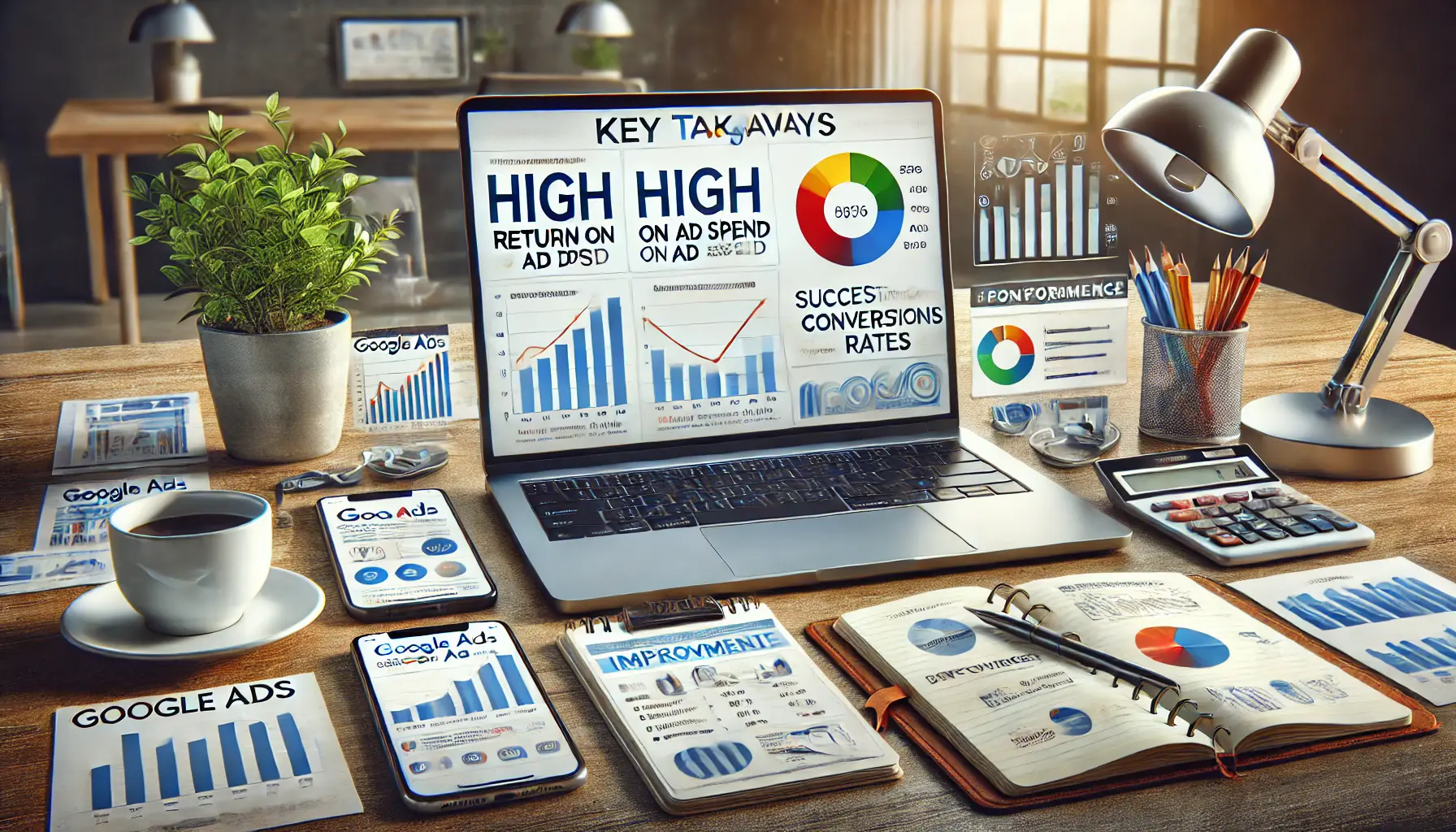
Illustration of key takeaways for success in Google Ads within a professional digital marketing workspace.
Key Takeaways for Success
To maximize the effectiveness of your Google Ads campaigns, consider these essential strategies:
- Focus on Relevance: Craft ads that align closely with user intent and ensure landing pages provide a seamless experience.
- Monitor Metrics: Keep up with KPIs on a regular basis to identify areas for improvement and measure the return on your investment.
- Optimize Budgets: Spend smarter by focusing resources on high-performing campaigns and perfecting your bidding strategies.
- Address Challenges: Overcome common challenges such as ad disapprovals, low Quality Scores, or high CPC to maintain efficiency in campaigns.
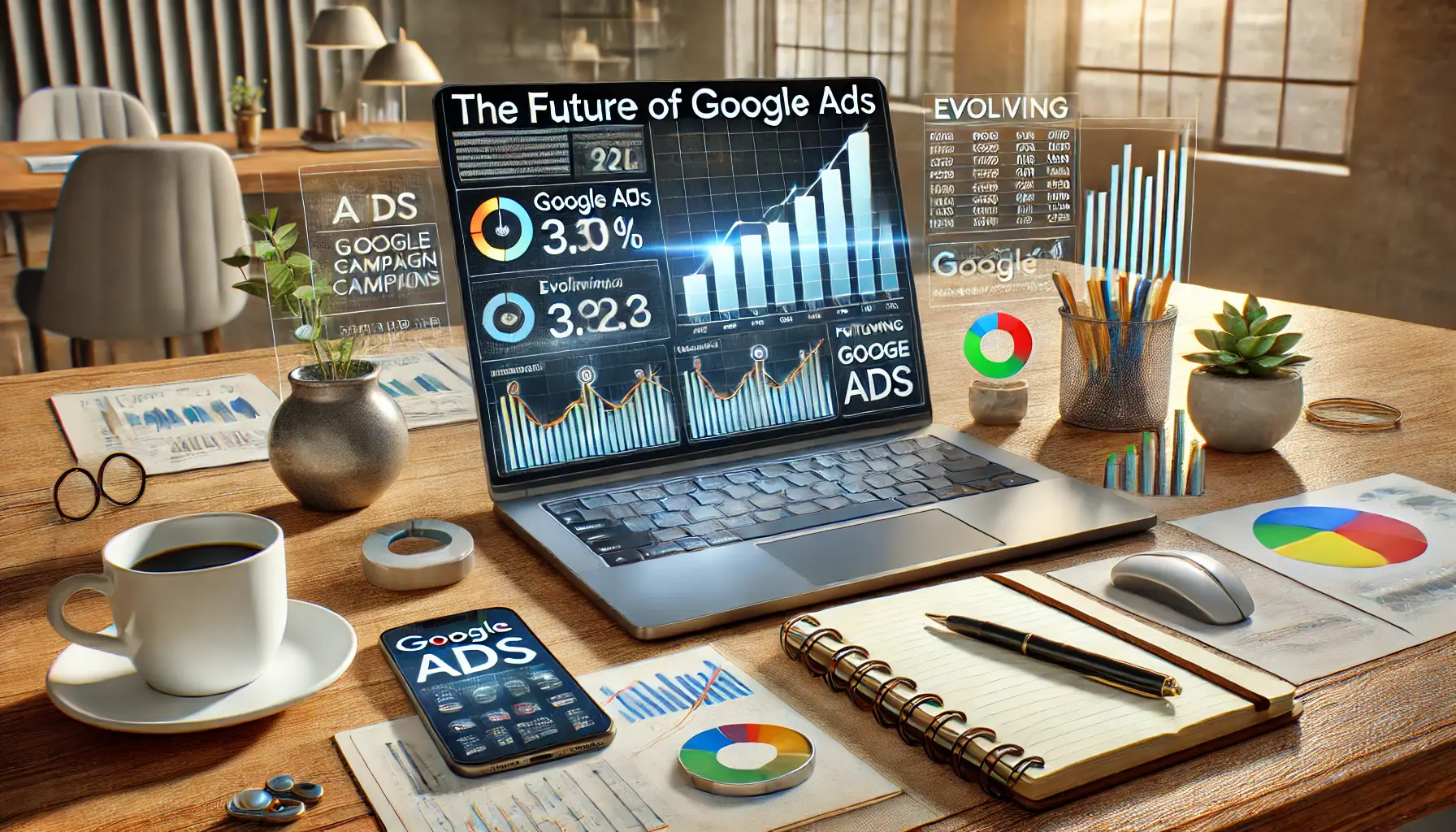
Illustration of looking ahead with Google Ads, focusing on future growth and continued success in digital marketing.
Looking Ahead with Google Ads
The ever-evolving digital marketing landscape continues to have Google Ads as its cornerstone for businesses looking to achieve growth.
Whether running your first-ever campaign or optimizing existing ones, staying updated on best practices and trends is crucial.
Remember, Google Ads work best when strategies are tailored to specific goals and continuously refined based on performance data.
With insights from this article, you can navigate the complexities of Google Ads with confidence and unlock its potential to drive success in your business.
Google Ads proves effective when paired with strategic planning and continuous optimization, making it a cornerstone of digital marketing success.
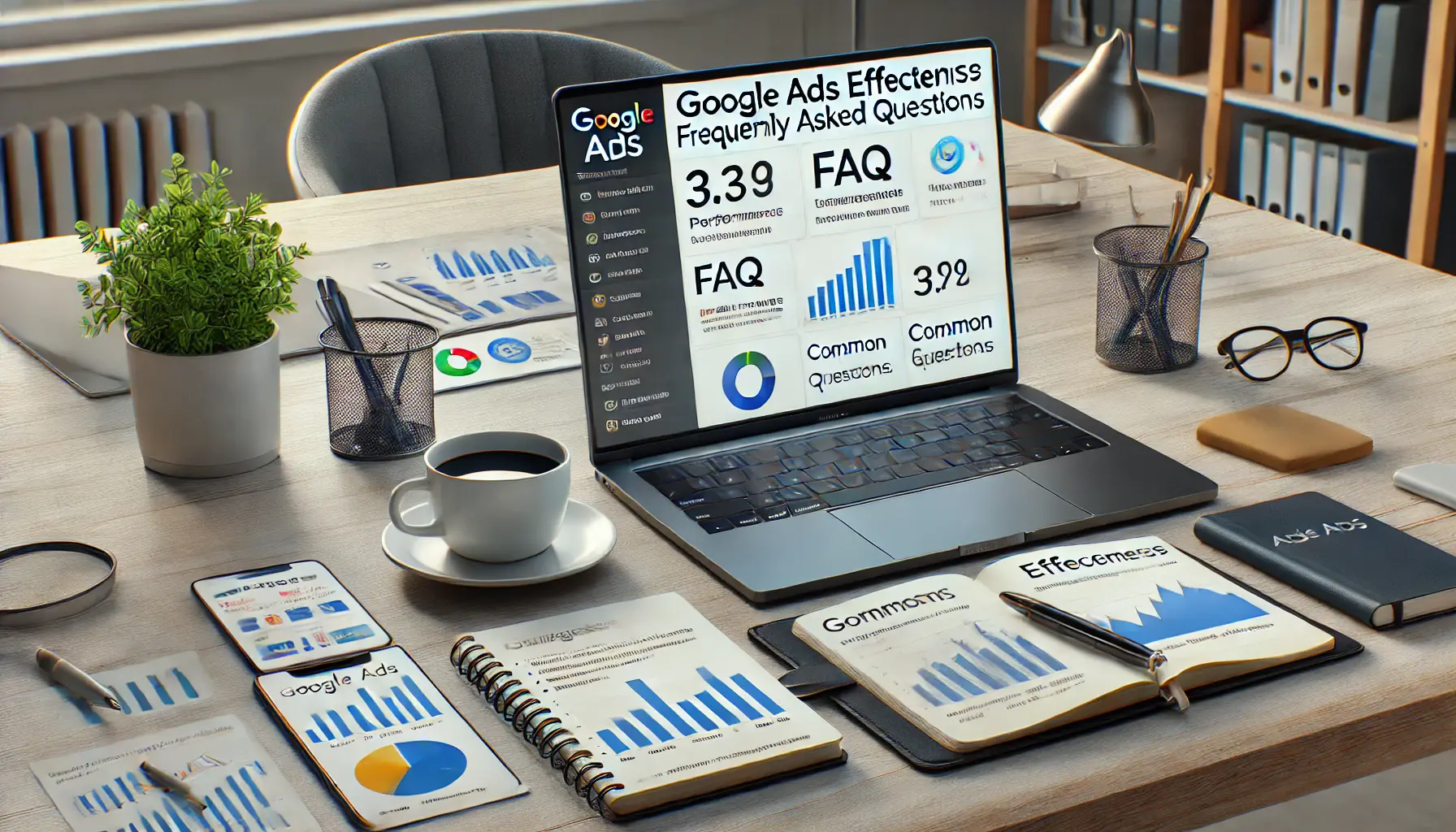
Illustration of Google Ads effectiveness and common questions in a professional workspace.
Your campaigns can be managed by an agency specialized in Google Ads, check out our service page.
Google Ads Effectiveness: Frequently Asked Questions
Understanding the nuances of Google Ads can help businesses leverage its full potential.
Here are some common questions and concise answers to guide you:
Ad placement is determined by the Google Ads auction, which considers your bid amount, ad quality, and expected impact of ad extensions and other ad formats.
Quality Score is a metric that evaluates the relevance and quality of your keywords, ads, and landing pages, influencing your ad’s position and cost-per-click.
Enhance Quality Score by creating relevant ad copy, selecting appropriate keywords, and optimizing landing pages for user experience and relevance.
Negative keywords prevent your ads from showing on unrelated searches, ensuring your ads reach the most interested users and improving campaign efficiency.
Google Ads uses an auction system where you bid on keywords.
Your bid, combined with Quality Score, determines your ad’s placement and cost-per-click.
Yes, Google Ads allows you to set daily budgets and maximum bids, giving you control over your advertising spend and helping you stay within your budget.
Success can be measured using metrics like click-through rate (CTR), conversion rate, cost-per-click (CPC), and return on ad spend (ROAS).
Remarketing targets users who have previously visited your website, showing them tailored ads to encourage them to return and complete a desired action.
Yes, Google Ads can be tailored to fit various budgets, making it a versatile tool for businesses of all sizes to reach their target audience effectively.
